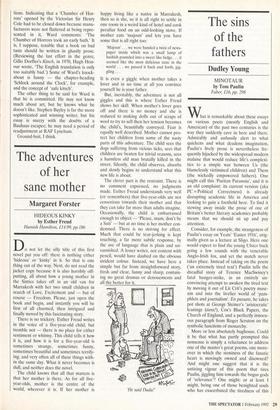The adventures of her sane mother
Margaret Forster
HIDEOUS KINKY by Esther Freud Hamish Hamilton, £14.99, pp.186 Do not let the silly title of this first novel put you off: there is nothing either 'hideous' or 'kinky' in it. So that is one thing out of the way. Next, do not read the jacket copy because it is also horribly off- putting, all about how a young mother in the Sixties takes off in an old van for Marrakesh with her two small children in search of Love, Excitement and — but of course — Freedom. Please, just open the book and begin, and instantly you will be first of all charmed, then intrigued and finally moved by this fascinating story.
There is no trickery. Esther Freud writes in the voice of a five-year-old child, but tremble not — there is no place for either sentiment or whimsy. This child tells it how it is, and how it is for a five-year-old is sometimes strange, sometimes funny, sometimes beautiful and sometimes terrify- ing, and very often all of these things with- in the same day. What it never becomes is dull, and neither does the novel.
The child knows that all that matters is that her mother is there. As for all five- year-olds, mother is the centre of the world, wherever it is. If her mother is happy living like a native in Marrakesh, then so is she, so it is all right to settle in one room in a weird kind of hotel and cook peculiar food on an odd-looking stove. If mother eats `majoun' and lets you have some that is all right too:
`Majoun' ... we were handed a twist of news- paper inside which was a small lump of hashish pounded into a sweet like fudge ... it seemed like the most delicious taste in the world . . . we passed it back and forth, gig- gling...
It is even a giggle when mother takes a lover and in no time at all you convince yourself he is your father.
But, inevitably, the adventure is not all giggles and this is where Esther Freud shows her skill. When mother's lover goes off and there is no money and she is reduced to making dolls out of scraps of wool to try to sell then her tension becomes the child's, beautifully conveyed. Fear is equally well described. Mother cannot pro- tect her children from some of the nasty parts of this adventure. The child sees the dogs suffering from vicious ticks, sees that children are beaten for trivial reasons, sees a harmless old man brutally killed in the street. Silently, the child observes, absorbs and slowly begins to understand what this new life is about.
The clever part is the restraint. There is no comment expressed, no judgments made. Esther Freud understands very well (or remembers) that five-year-olds are not censorious towards their mother and that they can take far more than adults imagine. Occasionally, the child is embarrassed enough to object — 'Please, mum, don't be a Suti' — but at no time is her mother con- demned. There is no striving for effect. Much that could be tear-jerking is kept touching, a far more subtle response, by the use of language that is plain and un- varnished. A lesser writer, not content with pencil, would have daubed on the obvious strident colour. Instead, we have here a simple but far from straightforward story, fresh and clear, funny and sharp, contain- ing no great dramas or denouements and all the better for it.
'He said Dada!'


















































 Previous page
Previous page